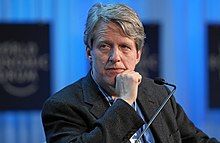
Dude Gets Nobel Prize, Writes Blog Post Defending His Field as Science !!!
We hear all kinds of criticisms, when we write about global warming forecasts and expose them as a pseudoscience. That feeling is understandable, because many biologists and bioinformaticians mention global warming in their grant to get government money. As we explained several times (see here and here), the science part of global warming starts in the distant past and stops at the present, whereas all future projections come from the domain of economics. Scientists, who do not understand the inherent limitations of economic forecasts, should not treat the information as scientific truth. Unfortunately, the projection (and scaremongering) part of global warming is what gets attention and grant.

Speaking of scientific truth, economics stands so far away from traditional sciences that a Nobel laureate has to spend the time between winning the award and his Sweden trip to defend his field as science in blog posts !!
Authored by Bob Shiller, originally posted at Project Syndicate,
I am one of the winners of this years Nobel Memorial Prize in Economic Sciences, which makes me acutely aware of criticism of the prize by those who claim that economics unlike chemistry, physics, or medicine, for which Nobel Prizes are also awarded is not a science. Are they right?
One problem with economics is that it is necessarily focused on policy, rather than discovery of fundamentals. Nobody really cares much about economic data except as a guide to policy: economic phenomena do not have the same intrinsic fascination for us as the internal resonances of the atom or the functioning of the vesicles and other organelles of a living cell. We judge economics by what it can produce. As such, economics is rather more like engineering than physics, more practical than spiritual.
You can read the remaining commentary here.
A good criticism of can be found in -
Robert Shiller on Economics Is It a Science?
What is truly cringeworthy though is the equivalence between economics and ‘engineering’ Shiller is proposing. Yes, many economists and their work are of course involved in ‘social engineering’, but that really shouldn’t be their job. We are not saying that economists should not give advice (the Lord knows, some good advice is sorely needed), but unfortunately most of the advice dispensed nowadays is downright dangerous, precisely because it attempts to provide politicians with a scientific fig leaf for social engineering. The truth is though that there is really nothing to successfully ‘engineer’, since the economy is not an engine, to put it bluntly. Oddly enough, Mr. Shiller himself seems to realize that to a certain extent, as you will see further below.
The problem is that once we focus on economic policy, much that is not science comes into play. Politics becomes involved, and political posturing is amply rewarded by public attention. The Nobel Prize is designed to reward those who do not play tricks for attention, and who, in their sincere pursuit of the truth, might otherwise be slighted.
Let us not forget that Paul Krugman also received a Nobel prize. Admittedly, so did Friedrich Hayek when Keynesianism was seemingly blown to smithereens in the 1970s (unfortunately it was merely zombified and has risen from the grave again), but Krugman surely is proof positive that political posturing doesn’t pose the slightest obstacle to winning the prize. Admittedly there is a lot of interaction between economics and politics. Nevertheless, as a science economics should be wertfrei, i.e., axiologically neutral. Shiller is quite correct that the sincere pursuit of the truth is precisely what it is, or should be, about.
Another commentary from the same blog by a different author -
Repeat After Me: Economics Is NOT a Science
Dow off 20 points on Tuesday. Gold down $6 an ounce. No biggie. On Monday and Tuesday, we visited our youngest son, Edward, a sophomore at the University of Vermont. His roommate joined us for dinner.
Okay, let me explain it to you, we said. The roommate was wondering if he should switch his major to economics.
Economics is a phony science. The more you study it, the more you think you know and the less you really know about how an economy actually functions.
Ill explain why in just a few sentences.”
If you are a real scientist, you start with things you can know and you can build on them.”
Water boils at 212 degrees Fahrenheit at sea level, for example. The molecules heat up then suddenly change from liquid to gas and the pot boils. Right? Happens every time. You can count on it. And with this knowledge, you can build a steam engine.”
So, the simpleminded economist comes along and says, Hey, an economy is like a pot of water! You heat it up you get more activity and GDP grows.”
The analogy holds up superficially. You heat up the economy by putting some fire under it. If youre a central banker, you lower interest rates. If youre a politician, you increase the deficit.”
You know theres a risk of overheating or causing a bubble. But you think you understand how it works. You think you can predict and control the outcome because youre a scientist who uses mathematical models, just like a real engineer.”
But the problem is you dont know anything. You dont know if an economy really is like water. You dont know where sea level is. For all you know, youre high in the Alps. And you dont know whether the fuel youre using adds to the fire or subtracts from it. QE, for example, may help heat up the economy. Or it may not. No one knows for sure.
To end, we must say that Bob Shiller happens to be one of the few economists we respect, especially for his work on long term stock market cycles.